- Home
- Adam Cesare
Mercy House Page 8
Mercy House Read online
Page 8
Would the sneakers squeak on the tile, betraying her location? Should she take them off and attempt the run in her socks? What was she doing? Would she land on an injury, squeal when she didn’t want to?
Make a decision. The voice was her own, but her calmer, younger self. The girl who’d been top of her class, disliked by her classmates, ignored by boys, and then only tolerated by her coworkers. In some ways, Sarah had always had a survivor’s mentality. Friends? There were no friends in competition, and life was a competition.
She’d killed a resident of Mercy House. One that was trying to kill her, but that did little to ease the sting. Even worse, she’d let a colleague walk into a trap. No, not a trap, a diversion. If she didn’t get her ass to those phones and call for help, she might as well have murdered Kate herself, if the nurse’s death had served no purpose.
She took one last look down the hallway and caught a glimpse of Phillips kneeling down next to Kate’s body. The man lifted her scrubs and squeezed one of her belly rolls in his hand, his fingers leaving dark marks on her pale skin. He said something and laughed to Ventura, his language unintelligible.
That won’t be me. It was more than a promise, it was an invocation. Sarah would not go like that. Trying to make her first step coincide with a boom of laughter, with more agility than she’d exhibited in high school, Sarah took three long strides, placed her hands flat on the waist-high desk, most of her weight on her less-mangled hand, and launched herself over the other side.
She landed with her knees on one of the station’s rolling chairs. The chair absorbed the shock of her one hundred and fifty pounds but she cringed as it crept forward under her, the noise of its wheels slight but distinct.
Rolling to a stop, she listened.
There were no hurried steps in pursuit. Sarah smiled to herself, despite the tears running down her cheeks.
Then the fluorescent lights above her flickered and died, and Mercy House was plunged into darkness.
Chapter 11
When it began to happen, the healing, Ivan Frank was reading through a familiar passage, perched on the edge of his seat, facing away from the rest of the rec room.
A few hours prior the room would have been filled with knitting circles and residents playing noisy board or card games, but now it was nearly empty, aside from a few people in front of the screen and a couple of chess players. Ivan did not often leave his room but when he did, it was when the rec room was least trafficked, when he was least likely to be talked to, whispered about, or gaped at.
If he never left his room, well, that would be a routine, and Ivan was afraid of falling into a routine.
Sir, have not the wisest of men in all ages, not excepting Solomon himself,—have they not had their Hobby-Horses, Ivan read and before finishing the rest of the line, he looked up from his tablet and studied the people around him, no one’s attention on him, all of them too absorbed in their activities to pay him any heed.
They did all have their hobbyhorses, but that didn’t mean those horses were unique, that they didn’t need to share their fixations with other residents. Some of his fellow residents played chess at the same time every day, with the same two or three opponents, the games getting a little shorter, a little less complex as time went on. Some of them watched the enormous TV, forgoing the set in their room to be plugged in to their headphones, their chairs spaced far enough from one another so that they weren’t having any contact with their peers.
There was an exclamation of victory as one of the last chess games broke up, an old man whom Ivan recognized but whose name he didn’t know raised his hands above his head, a geriatric Rocky, and strode out of the room, his opponent rubbing his cheek in dumb disbelief, as if he’d really been sucker punched instead of just placed under checkmate.
Eventually, of course, one of these residents would die. But it didn’t matter if it was one of the chess players or the knitters, a new resident would be taken into the fold of either clique, the seat at the chess table remaining filled, the fabric of the Barcalounger not even cooled before another TV addict moved in to take his fallen sister’s place.
Maybe it was because Ivan had been living with physical impairment since he was twenty-two, but he felt that he was much better able to deal with the homogenizing effects of rest-home life. These people weren’t used to isolation and therefore hadn’t acclimated properly, hadn’t found things to spend their time on and that gave them fulfillment. It wasn’t as if Ivan hadn’t struggled with that. He had, after returning from Vietnam, after his accident.
The accident had been stupid, really, existing on some level of irony that he couldn’t step far enough back from to see the humor in. He’d sustained burns on 70 percent of his body after coming home from the war, just out driving his truck. He hadn’t even been drinking, much, he’d just been tired, had nodded off and woken up pinned down by the steering wheel, flames licking him from all sides.
There was recovery, but he couldn’t remember most of it. It was an inky black stretch of memory that was comprised entirely of wet gauze and screaming himself hoarse. After that there were a few years of rage, of being so angry at his condition, at himself, at the perceived cruelties of the world, that his activities consisted solely of drinking, crying, and chopping wood.
Following that period of anger, though, was acceptance, nearly forty years of knowing how to cope was a blessing and made his life much fuller than those of the people surrounding him in the rec room. He had ways of dealing with the loneliness, the exile. They didn’t, so they clung to their groups, bound to other people by their passing interest in bingo, in their soap operas, by their paralyzing fear of dying alone and unnoticed.
With his scar tissue, his bad eye a milky mess that occasionally leaked pink fluid, Ivan didn’t have to worry about going unnoticed, so instead he focused on keeping his mind sharp. With books. With mixing up his routine. He’d even tried yoga, but found it too painful, his range of motion severely limited by his joint problems and melted flesh.
He would attend veterans’ meetings, spurred on by the staff, but he never shared and he went only because he enjoyed listening to the stories of the men around the circle. Those men were the closest thing he had to a group, but Clemson, Piper, Beaumont, and the others wouldn’t consider him a friend. Ivan didn’t know if they hated him, pitied him, or were completely apathetic toward him. They were too hard to read.
Ivan was waiting for death, and he was waiting alone, but it wasn’t depressing to him. He’d always wanted to read the great works, and now he had the time, and the means, with the little Kindle machine that he’d been gifted upon arrival. Most of the books he’d wanted to read were out of copyright anyway, so they were either cheap or free.
Funny as he was, Laurence Sterne wasn’t doing much for him tonight, so Ivan decided to flip back to Moby-Dick, see if he could slog his way through a couple more pages. He’d almost gotten into it, too, had given about forty minutes of time to the book, when the fight broke out.
The early evening serenity of the rec room was sometimes upended by channel disputes, those were usually battles of the sexes, Monday Night Football versus tapes of Dr. Quinn, Medicine Woman, but tonight was different. It was a girl fight, over a man.
“Let him go,” the woman closest to Ivan yelled, pulling on the man’s arm.
Ivan turned in his seat to look, angling his good eye to view the TV area.
The three of them were in the last row of seats, the other residents watching the screen with their headphones on, oblivious to the shouting match going on behind them.
In the middle of these two large women, both of them looking older than him by a good decade, and the women’s weight easily adding up to quadruple his, was a tiny bald man, each arm gripped tight by an admirer.
The women considered each other and then growled.
Well, that was enough of that. Ivan wasn’t going to be able to read in peace. It was beginning to smell in here, anyway. Whatever special dessert the kitchen had
concocted for dinner was wafting across the hall into the rec room, sickly sweet.
He switched his Kindle to sleep mode, closed the cover, and rose up from his seat. As he left he pointed his eyes to the tile floor, hiding his face from the smattering of residents he passed.
Ivan was not able to reach the doorway without turning around to look toward the seats, though, to see what the wet smacking sound was. One of the women had tackled the other in front of the screen and was pummeling her, alternating shots to the nose and cheek.
Behind her, not only was nobody helping but they were all still seated, their mouths curled into smiles, their headphones still cupped over their ears.
Before Ivan could puzzle out any more of this scene, he felt the tearing begin. What would later be considered the Healing for everyone else felt like anything but for Ivan Frank. It began as an arthritic throb in his joints, but things escalated quickly. His healthy skin and scar tissue were having a disagreement, had decided to split up.
The woman being beaten, the hoots of her audience, were not the only sounds at Mercy House. Down the hallway he could hear younger voices screaming, and it took about a half minute of writhing on the floor before Ivan added his own yells to the chorus.
The pain was complete, the phantoms of the accident and recovery flooding into his synapses, sensations he hadn’t felt in fifty years starting anew, his skin tearing all the while, adding a new level of agony to the mix.
He looked out into the hallway then, his body now half in and half out of the rec room, and saw a group of residents descending the stairs from their rooms above. Some of them laughed at him, some of them didn’t even notice him, looking at the scene behind him. Blood hit the bulb of the projector, sizzled, and turned all the action pink on the screen.
The faces of the group above him were familiar yet foreign, the bones under their skin beginning to shift and change, flesh pulled tight over their skulls. He recognized the faces, though, they were a knitting circle, they had found one another before coming downstairs to investigate.
Ivan felt the sweat cooling on his brow, along all the stretches of healthy skin he had, but he also felt the blood from his wounds, warm as it mixed with the sweat, the salt that fell into his gashes becoming new tiny jolts of pain. He lay there, twitching and blubbering for the better part of ten minutes, residents stepping over him, some of them joining whatever action had begun in the rec room, some of them yelling for food, heading to the cafeteria, but all of them moving together, at least in pairs, and the biggest groups moving like street gangs.
The pain began to subside as his body settled, his bones stopped stretching. Either that or he’d gone numb. Ivan Frank picked himself up off the floor, his most recent taste of pain not only bringing back that rage he’d felt as a young man but making him long for a group of his own, somewhere he could belong.
Chapter 12
Can the enemy detachment communicate with the rest of its force? No? Then the war is halfway won.
Arnold took all the fuses off-line, then used an antiquated fluids stand, jagged at one end from where he’d bent it over on itself, to pry the control panel off the wall. The basement was littered with surplus supplies and the stand was just one of many objects that could be weaponized.
He knew the backup generators had to be nearby, but he couldn’t find them beneath all the boxes and junk. After a moment without power, they began to hum, their engines purring to life. He found them buried under a stack of outdated wheelchairs, some of the chairs so old that they sported wicker seats. After clearing a path to the generators, he shut them off and then used his spear to poke holes in the fuel reservoir. He did not empty the canisters stacked nearby. Those could be of use later, once he’d mustered his forces.
Standing in the darkness of the basement, Arnold let his eyes adjust to the dim red glow of the single emergency bulb located all the way by the staircase. He’d remembered something that he’d been thinking about night vision, but that was earlier today, in a past life. Before the war. What he’d seen on his way down here had been anarchy. The sudden, violent dissolution of order was a phenomenon familiar to anyone who’s been first on the ground.
The destabilization was only a first step, though. Faction lines would soon be drawn and when they were, Arnold would need to be on the winning team. No, he’d need to be the winning team. Commodities control was the name of the game in any situation like this, and there was no more valuable commodity than personnel. He would need to recruit men. Not just men, soldiers. Luckily, Arnold could hear a few recruits coming down the stairwell as soon as he opened the door.
Chapter 13
Nikki’s entire left side throbbed, not from when she’d fallen out of her seat in the dining room but from slipping in the hallway outside. Paulo had been waving her along, his big arm a pinwheel moving with football coach urgency. “Come on!” he mouthed.
Nikki did her best to hustle and promptly had her legs swept out from under her, her shoes leaving the ground with a squeak. If she hadn’t had enough of her husband’s blood smeared on her by Harriet, she now had one side of her body coated in a stranger’s.
It was still warm.
Paulo offered her a hand up and shuttled her into a doorway, out of sight of the rest of the first-floor hall. Using the back of his hand he lifted her chin and made eye contact, pleading with his dark eyebrows. He was giving her a silent pep talk, and it worked, to some extent. She didn’t scream, didn’t lose it, but instead just listened to the sounds of Mercy House.
There was action all around them; thankfully none of it spilling into the hallway. There were yells and cheers from the rec room behind them, the clatter of plates and utensils from the cafeteria to their right. It was as if they’d time-traveled in the hour they’d been in the dining room, Mercy House coming alive as if it were midday, not approaching night. But if the other residents had been given the same brand of get-up-and-go as those who’d just attacked them in the dining room, Nikki and Paulo would need to flee the building without being spotted.
Paulo had locked the doors behind them, but the dining room had separate exits into the kitchen, and from there to the rest of the building.
Nikki forbid herself from thinking they were locking Don in there with them, the monsters. Don was gone. She wanted to cry and scream and yell about it, and she would, later. Now the world around her carried the patina of unreality; this was a gruesome dream and a movie and a video game all at once, and she would not feel the repercussions of it until she woke up.
She knew enough about grief and shock to be aware of what the chemicals in her brain were doing right now. She’d seen the same symptoms present themselves in children a few times, in especially bad cases, but this was her first experience from the inside looking out.
There was a pause in the chaos around them. Nikki could hear her own teeth grinding and had to force herself to unclench them, her jaw sore as she did. She was so flooded with endorphins that she could have had both hands in a waffle press and have no idea, but for the smell.
“We hit the front door,” Paulo whispered, “and then we don’t stop running until we find someone to take us into town, okay?” Neither of them had their car keys; hers were with Don, and Paulo’s were upstairs in the locker room, he explained.
Paulo moved his hand from her cheek and took up a batch of her hair, a motion that felt too intimate for someone she didn’t know, but Nikki then realized that he was wringing the blood out of her curls. Her hair felt heavy and she wondered how much fluid from how many different people was weighing it down.
They crept through the hallway, one of the two double doors to the cafeteria propped open, but none of the residents inside seemed concerned with them as they zipped by. Apparently there had been a recent mass exodus from the rooms upstairs, all the residents at once deciding to grab a midnight snack. Nikki was able to spot a man using his hand to spoon orange goo into his mouth from an industrial-size can of Cheez Whiz. Other men and women in t
he room helped themselves to the steam trays while standing on the wrong side of the counter.
While the men and women in the cafeteria were certainly uninhibited, this group did not seem as violent as Harriet, Beatrice, and friends, and Nikki allowed herself to wonder why that might have been. Was it a kind of mass hysteria? Did they feed off each other’s vibes? The tenor of the dining room had been hostile before whatever murder switch had been thrown. Did that explain the mutilation and blood drinking? Or were the residents in the cafeteria just taking a break, building up their energy for a big night?
After the cafeteria, it was one set of double doors and then a straight shot to the atrium/waiting-room area where Don and Nikki had entered this afternoon. As they walked, the lights above them blinked and then fought to reignite briefly before falling back dead. Red emergency lights replaced them, but offered very little to see by.
Paulo scoffed. It was a small sound from which Nikki was able to interpret volumes of exasperation, disappointment, and fear. Yes, it did figure. It was just their luck.
Offices lined the hallway. Some of them had their blinds shut, some open. With the darkness, it was impossible to tell if the glass housed attackers on the other side, waiting in the impenetrable gloom. But that wasn’t likely, was it? Whatever was happening, it was affecting only the residents, so far. Any Mercy House staffers still in the offices, working after hours, would probably have been spared the madness. Was it something in their food? A disease? A biological attack by extremist geriatrics? It didn’t much matter.
Paulo hooked his ear to the crack in the doors that led to the anteroom and listened, and even Nikki was able to hear the movement on the other side, echoing in the big room.
“I wouldn’t,” a voice hissed in the darkness. They both turned to the doorway beside them, but there was nobody visible. The door was open a crack and the voice continued. “They’re in there. And I’m in here trying to wait them out.”

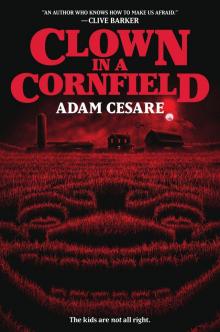 Clown in a Cornfield
Clown in a Cornfield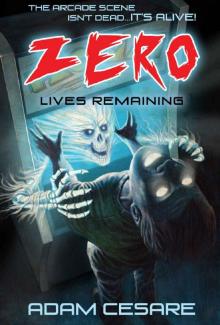 Zero Lives Remaining
Zero Lives Remaining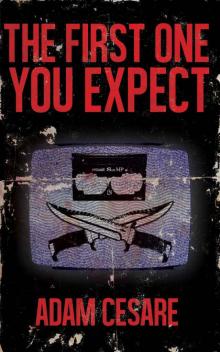 The First One You Expect
The First One You Expect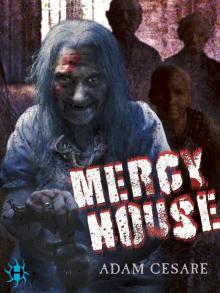 Mercy House
Mercy House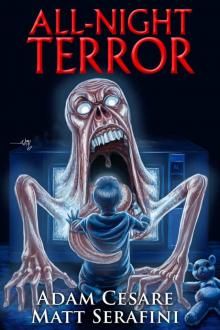 All-Night Terror
All-Night Terror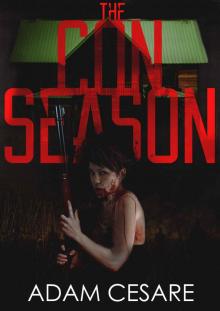 The Con Season: A Novel of Survival Horror
The Con Season: A Novel of Survival Horror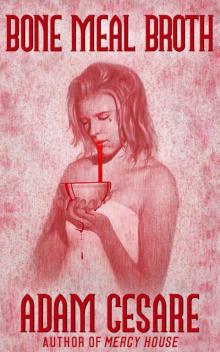 Bone Meal Broth
Bone Meal Broth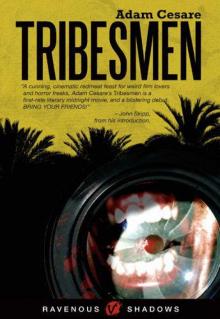 Tribesmen
Tribesmen